Hi there! Thanks for joining us as we review another router from TP-Link. This one’s called the Archer AX55 (we’ll just call it the AX55 for short), and it’s a good one.
To help get to the bottom of just how good (or bad) every aspect of this router is, we’ve been subjecting it to some vigorous tests. We’ve run tons of download and range tests and explored each of the features to see what they can do.
After analyzing our findings, we believe we’ve got to the bottom of it. And now it’s time to share all that info with you. The bottom line is that this router represents very good value in the mid-range category.
There are a couple of issues with it but they’re minimal. Overall, the AX55 is a good router for those with internet plans up to 800 Mbps and medium-sized homes.
Make sure you stay with us to find out whether it’s the right router for you. If not, we’ve got some other options for you.
Specifications
| Brand | TP-Link |
| Model | Archer AX55 AX3000 |
| Max Tested Wi-Fi Speed | 743.49 Mbps |
| Approximate Range | 90-100ft |
| Wireless Standard | Wi-Fi 6 |
| Bands | 2.4 GHz, 5 GHz |
| WAN Port | 1x Gigabit |
| LAN Port | 4x Gigabit |
| USB Port | 1x USB 3.0 |
| QoS | Yes |
| Parental Controls | Yes |
| Guest Network | Yes |
| OFDMA | Yes |
| Dimensions | 10.2 × 5.3 × 1.5 in |
| Weight | 957g |
| Warranty | Limited lifetime |
TP-Link Archer AX55 Overview
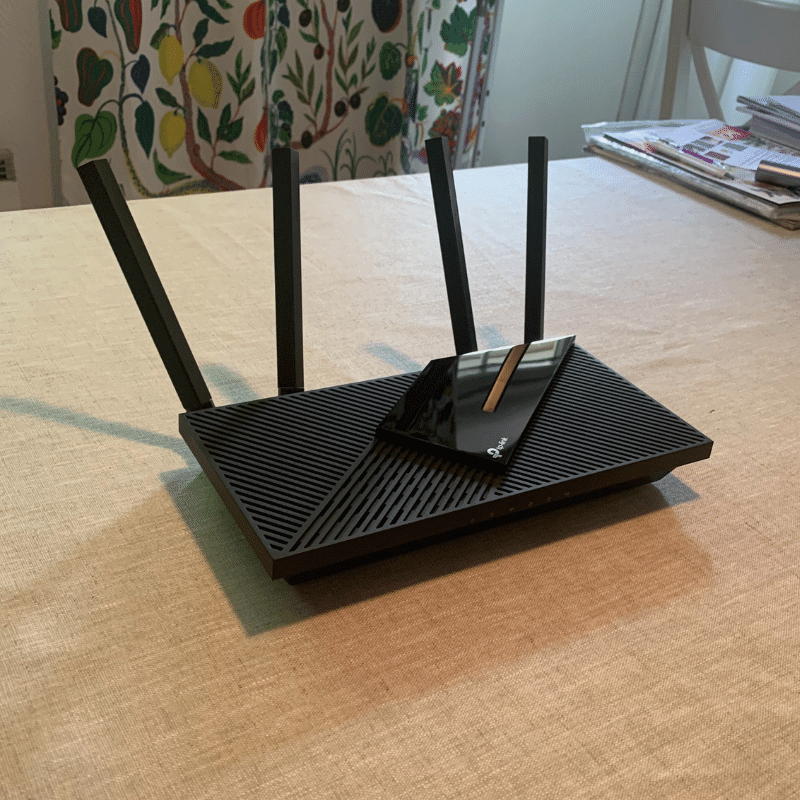
The price of the AX55 puts it into the mid-tier category (not high budget but not quite a performance). However, it’s at the lower end of that category by comparison. In that respect, it’s a good value!
This thing’s got a fair amount of speed in its locker. It’s not far off the pace of far more expensive routers. We ran a speed test on a device 5ft away and it clocked in at 743.46 Mbps. We’ll contextualize that shortly but for now, let us just say: it’s really quick!
Those with small or medium-sized homes will be more than happy with the range of the AX21. We found it to be between 90 and 100ft. That should do the trick for most!
And it’s range that leads us to one of the highlight features of the AX21, OneMesh. This is TP-Link’s branding for Mesh compatibility. Mesh allows you to connect extra satellites, expanding the network range without the need for multiple network names.
Looking for enhanced protection? TP-Link’s antivirus and parental controls bundle HomeCare is available for it. But you will need to pay a subscription for it which is kind of disappointing. It’s one of the only things we don’t like about it.
So a little more information may be needed before you’re able to decide once and for all if this is the right router for you or not. Don’t worry though. By the end of this article, you’ll be able to make that call with confidence!
Performance: 4.6
The Archer AX55 performs pretty well in every respect. The top speed we managed to get from it at a distance of 5ft away was 743.49 Mbps. That is really fast! Here, you’ll be able to stream 29 Ultra HD Netflix movies at the same time if you so wish.
Downloading will be rapid too, of course. You can download a massive 100 GB file in less than 18 minutes. Blitzing!
A similarly priced router, the Linksys MR9600, only managed a speed of 455.55 Mbps. That goes to show that the AX55 offers some of the best value at this price.
In fact, the router that we named as the best one right now (the ASUS RT-AX56U) only managed 10 Mbps faster than the AX55 with a speed of 754.02 Mbps in our tests. So the AX55 is more than up there.
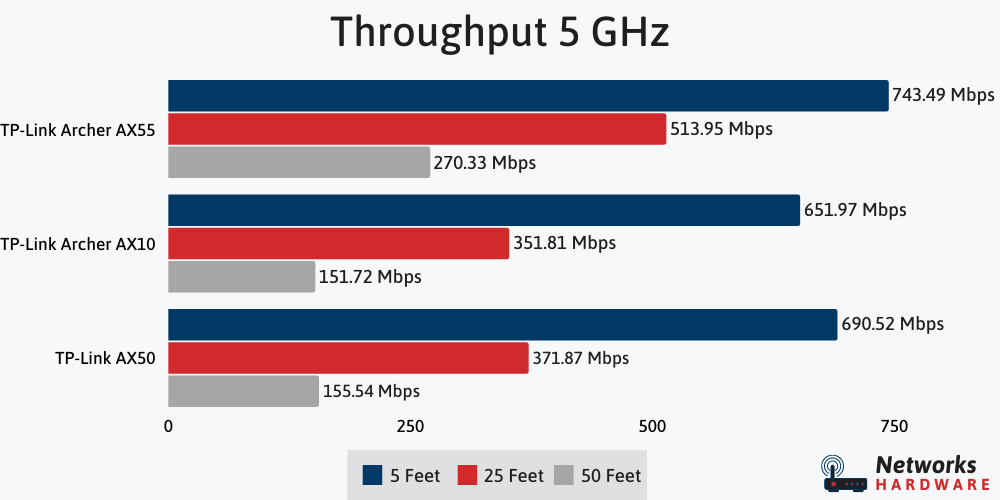
So, it’s definitely fast. But that’s not all. That speed holds up as you move further away from the router. We ran the same speed test from 50ft away and it clocked in at 270.33 Mbps. That’s 115 Mbps more than the only slightly less expensive younger sibling, the AX50, which managed just 155.54 Mbps.
The AX55 doesn’t hold onto its speed quite as well as the ASUS RT-AX56U, by comparison. This managed a speed of 390.31 Mbps from 50ft away, some 120 Mbps more. But overall, the AX55 is one of the best budget routers for speed across the board.
The overall range of the AX55 is pretty good as well. Our tests showed that it’s possible to maintain a connection to it from as far as 90-100ft away. Put this router in the middle of a medium-sized home and you should be able to get a connection throughout.
And if you can’t, you can extend the range seamlessly thanks to Mesh technology. We’ll cover TP-Link’s OneMesh feature in a bit more detail later but to cut a long story short, it means that you can add extra satellites to enhance the range on the same network.
So all in all, the AX55 actually has better range and speed than some more expensive routers. However, there is just that RT-AX56U which does a little bit better for around the same price.
Features: 4.5
When you buy a TP-Link Archer AX55, you get a few cool things thrown in with the price in terms of features. These things make it even more worth the price! Let’s find out what’s in store.
Tether app
Most of the features of the AX55 are ‘tethered’ together by the TP-Link Tether app. You can control the likes of QoS and parental controls through the app. Plus, you can change more intricate network settings through it.
On top of that, setting up the router in the first place is really easy with the app. We’ll go into a bit more detail on that later, though.
Using the app for your settings and setup is a lot better than using the classic network configuration page. The interface is nicer and that makes life with the app a lot easier.
QoS and parental controls
If you’re not familiar with QoS and parental controls, then get to know! These features can really change the way you use your network.
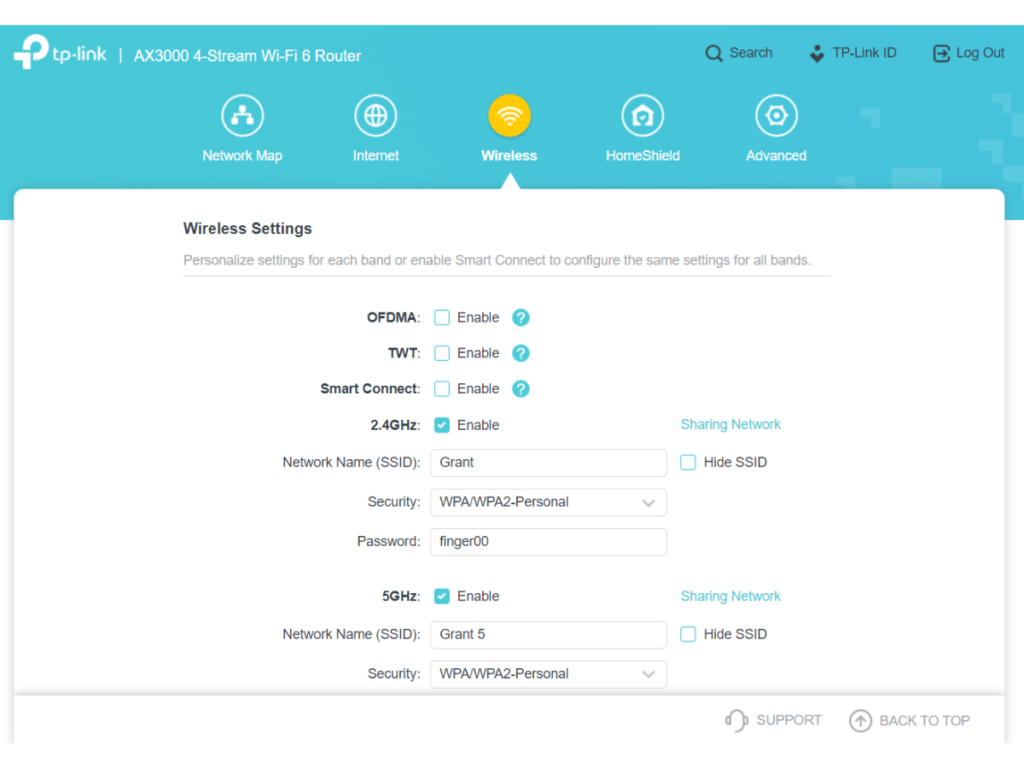
Let’s start with QoS. This is a nifty feature that allows you to set priority to some devices on the network. If you’re about to go into a gaming session or download a large file, for example, you can get lower latency and faster speeds for any device for as long as you need.
This will constrain the performance of other devices on the network but it’s a great thing to use intermittently. It can be particularly useful if you have a lot of devices connected to the network at any one time.
Parental controls on the other hand help you restrict access to certain content to certain devices. So, you can keep kids’ eyes away from anything inappropriate or malicious.
The parental controls and QoS on the AX55 are a bit basic. You’ll find that there are limitations in comparison to the parental controls of some other manufacturers. To get the best of TP-Link’s parental controls, you’ll need to upgrade to the HomeCare subscription. Let’s take a look at that.
HomeCare
If you want awesome antivirus technology with your AX55 to protect your home network, you can get it. But it comes at a price. TP-Link’s HomeCare is a subscription product that will charge you a certain amount every month.
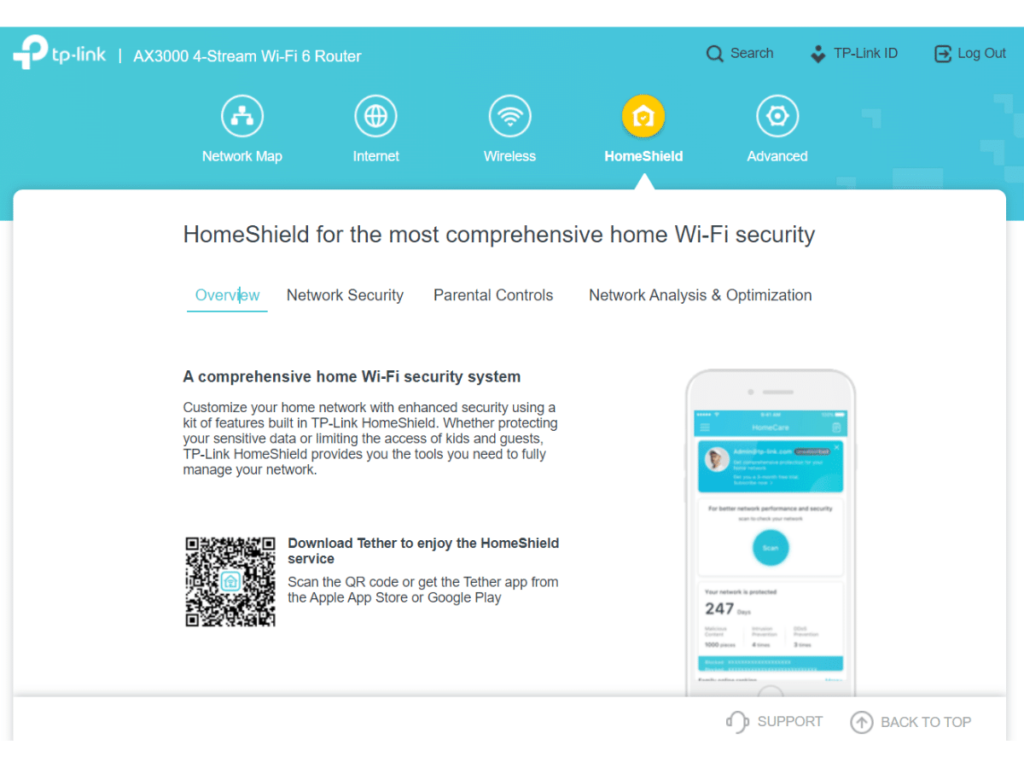
We do recommend going for it though. If your router picks up a virus, it can compromise every single device that’s connected to the network. That would not be ideal!
The other cool thing about HomeCare is that it boosts the potential of the parental controls. The extra parental control features you get with HomeCare are the ability to set profiles to users (meaning you can add all their devices to their name and control everyone as one) and set timings to the parental controls.
Other security
TP-Link does offer some great security features even if you don’t opt to subscribe to HomeCare. A good example of this is the inclusion of WPA3, the latest and greatest security protocol.
WPA3 does an awesome job of protecting your personal information, namely passwords for your online accounts and credit card details. You can never be too safe with stuff like this which is why WPA3 is a good thing to have on your router.
OneMesh
Something we particularly love about the AX55 is OneMesh. This is TP-Link’s branding for Mesh readiness, meaning you can add Mesh satellites to the network.
If you’re not familiar with Mesh, it’s effectively a way to increase the range of your home network but still keep things on the same network name. That’s better than a standard Wi-Fi repeater which forces you to connect to a new network whenever you go out of range of the original signal.
OneMesh isn’t as good as a full-on Mesh system as it isn’t as powerful, but it is still an awesome thing to have for people with larger homes. We just wouldn’t recommend it to anyone who needs to add more than a couple of satellites.
Warranty
TP-Link is pretty great with their warranty. A lot of their routers have a limited lifetime warranty, the AX55 included. This means you’ll be covered for any faults with the router for as long as you own it.
That’s a lot better than other manufacturers. With some, you only get one year or two at a push. That extra peace of mind is worth a lot in our eyes!
Design: 4.5
The AX55 is a pretty neat-looking piece of hardware. It’ll certainly won’t look bad on your shelf with a solid build quality and a nice finish.
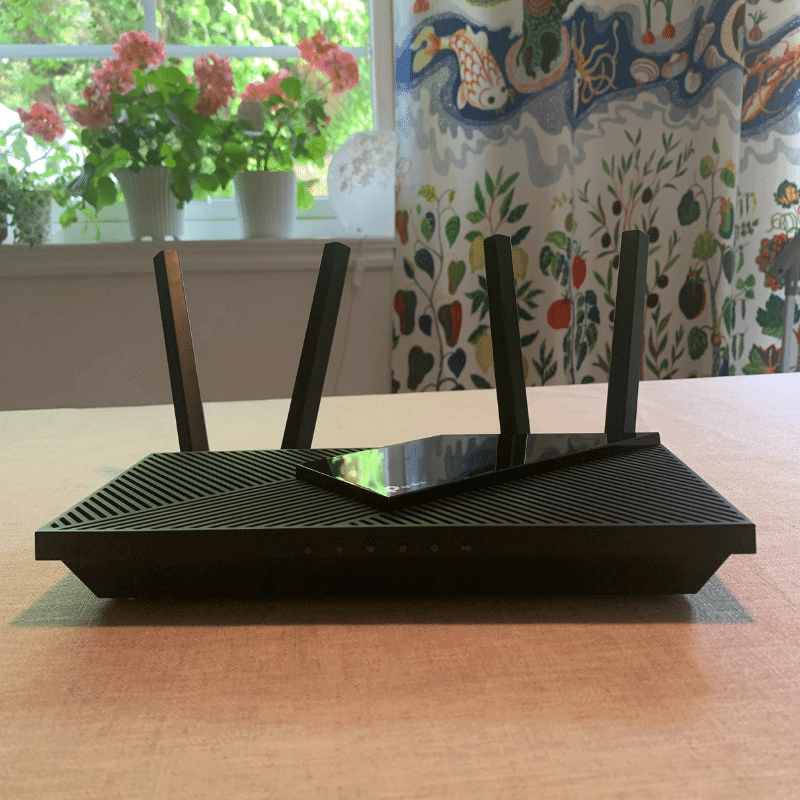
It’s a little on the long side at just over 10 inches so if you only have a small amount of space to put your router you might want to consider this. However, it’s short and narrow so overall it looks quite inoffensive.
You shouldn’t have any issues transporting it either. The antennas are collapsible and the router itself is of an average weight at just under a kilogram.
There are more good things about the design practicality as well, and they are the ports. The AX55 has four Gigabit LAN ports which means you can plug in four pieces of hardware with Ethernet connections for a wired connection. You’ll get a lot more speed that way.
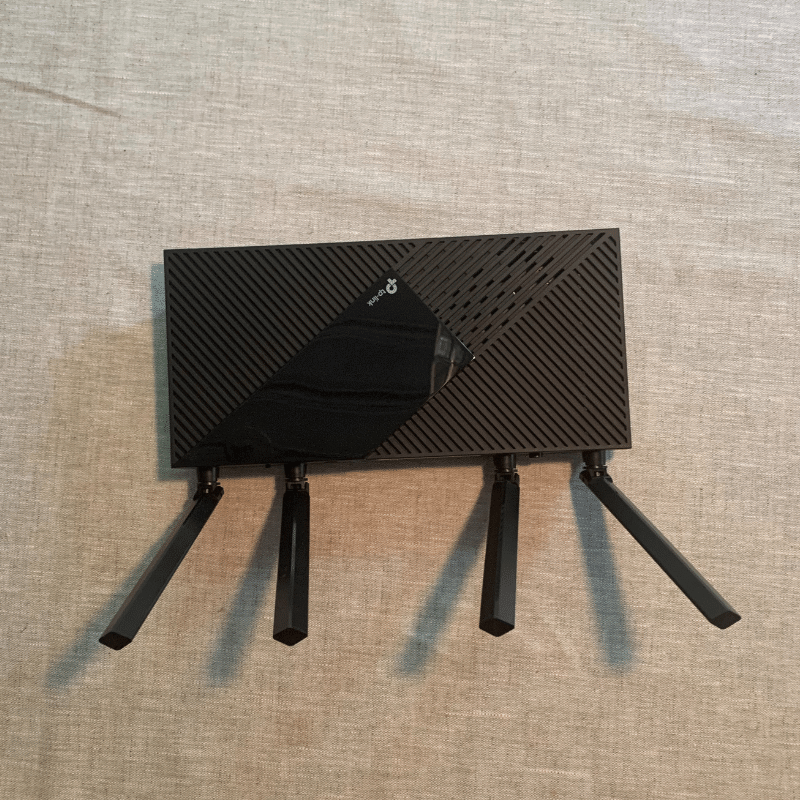
Some are critical of the fact that there is no multi-gig LAN port here. A multi-gig LAN port is a port for plugging in internet devices that has speeds of more than a Gigabit, usually 2.5 G or more. This is only going to be an issue for those with crazy fast internet speeds though.
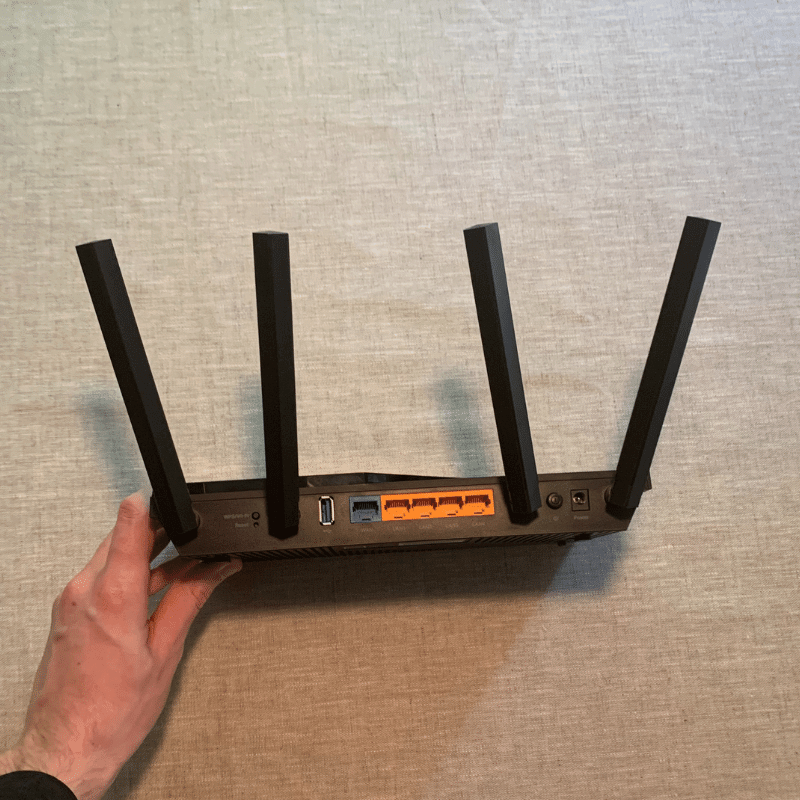
There is one USB port here so you can plug in external hardware if you so wish. Plus, it’s USB 3.0 as opposed to USB 2.0 so you’ll get faster data transfer and charging. Not many people will actually use this but we’re sure some of our readers will be able to make the most of this.
Setup: 4.7
Thanks to the Tether app we discussed just now, even the least tech-savvy of readers should be able to set up their AX55 with ease. The whole process will only take a couple of minutes and it requires the minimum of effort, so respect to TP-Link for streamlining the process like that.
All you need to do is plug it in with the cables that come in the box then power it on. Download the Tether app from the App Store or Play Store (depending on your smartphone brand) and switch on your Bluetooth.
Once you open the app, just follow the instructions on the screen and your phone should find and set up the router for you. It’s as easy as that.
Those who don’t have a smartphone can get around this, don’t worry. Simply open up your desktop browser and enter “192.168.1”. Again, just follow the instructions on screen, and it will be a similar process from this point.
The non-smartphone method does take a bit longer but it’s always nice to know the option is there if you don’t have the right tech!
Value: 4.6
Overall, the value of the TP-Link Archer AX55 is great. Sitting in the mid-range territory it compares well to other models such as the ASUS RT-AX3000.
The biggest drawback of the value is that you need to pay for some of the extra features and protection in the form of HomeCare.
This will set you back $6/month or $55/year depending on how you choose to pay it. Even though you don’t need it if you don’t want the extra features.
Anyone with an internet plan of around 800 Mbps or less and a medium to slightly above medium-sized home will do good with the AX55.
That said, if you have an internet plan over 1000 Mbps, consider some of the alternatives later on in the article.
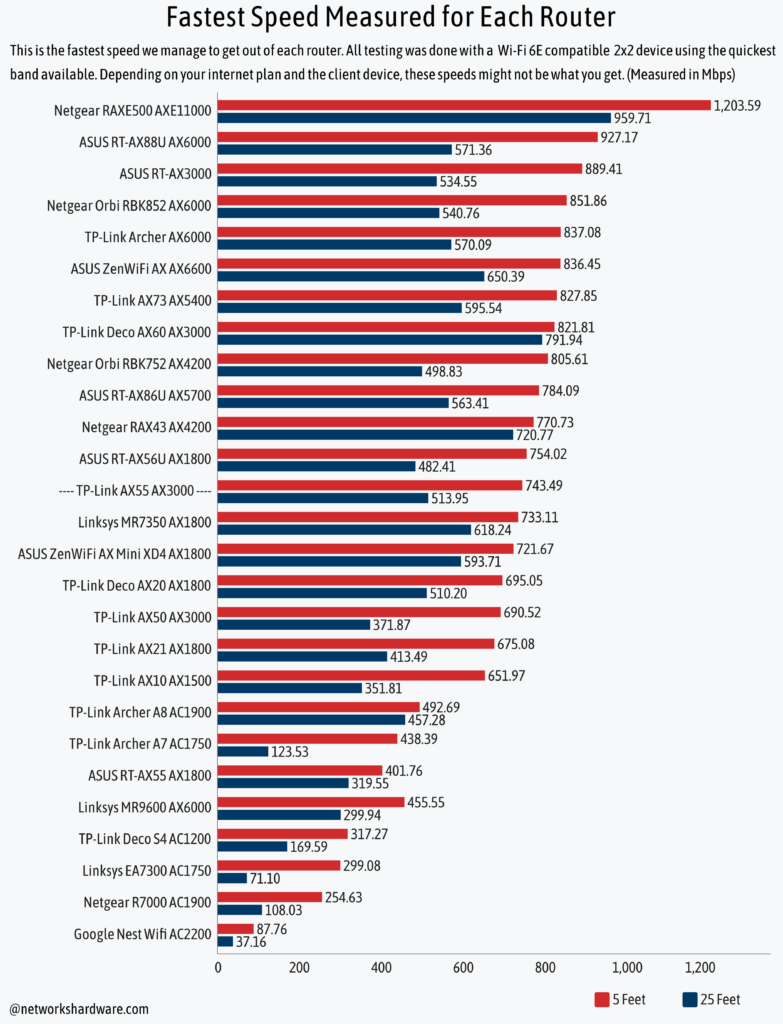
Thoughts From Other Reviewers
Here at Networks Hardware, we’re all about giving you the most neutral information possible. That’s why we like to incorporate the thoughts of other reviewers in our router reviews. That way, you can get a more balanced opinion overall!
At this point, opinions can often be split. But in the case of the AX55, people seem to be pretty happy with the AX55 across the board. There are a couple of niggles as there are in our own review, but the general consensus is good.
Let’s start with the positives. One of the most common themes here is that the price for what you get in terms of performance is really good. As we mentioned earlier on, this router is in the mid-range category for budget but at the lower end of it, outperforming even less powerful routers.
There’s been a lot of praise for the ease of use and setup as well, and a big part of that is because of the Tether app. In fact, the AX55 is so good that a handful of reviewers have named it in their best Wi-Fi 6 routers of the year, 2022!
The minor cons are limited in number. Some people aren’t happy about the lack of multi-gig ports, which is understandable. There are also some complaints about the fact that you have to pay a subscription fee to get antivirus in the form of HomeProtect, but that’s not the end of the world.
All-in-all, the AX55 has received strong reviews across the board and we can totally understand why!
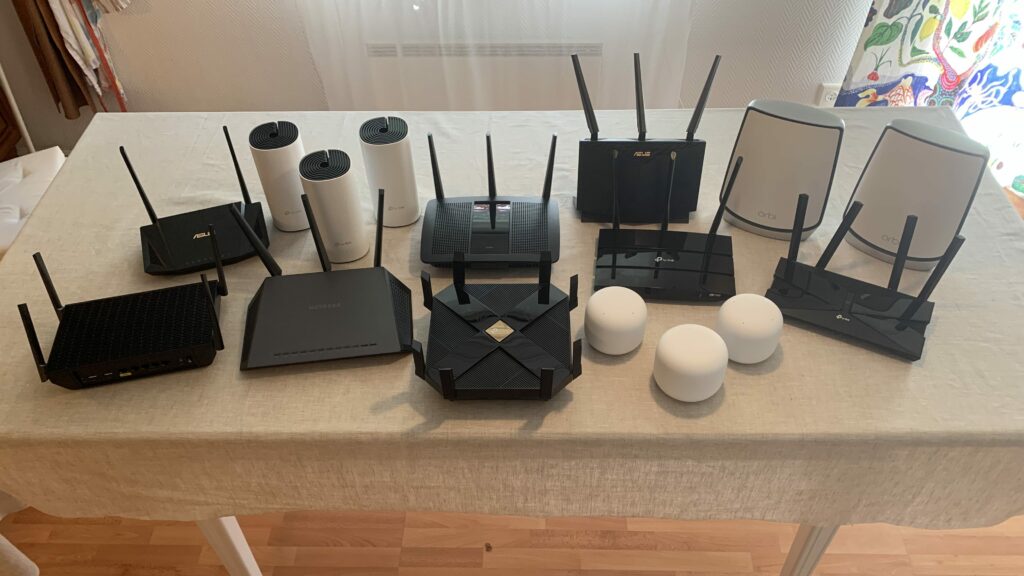
Some Other Options to Consider
As good as the AX55 is, it’s always going to help to secure (or change) your decision if you have a look at a handful of other routers. So here’s a little snapshot of some of our other favorites that are definitely worth bearing in mind as well.

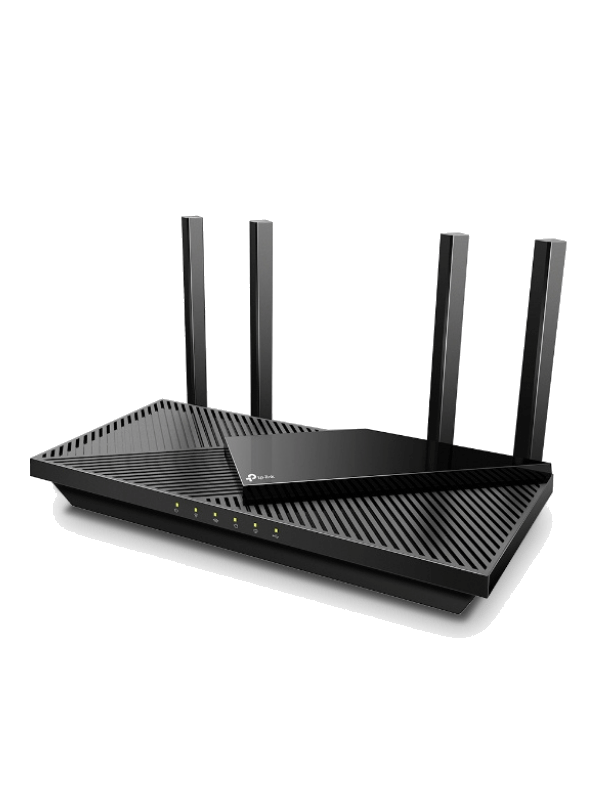
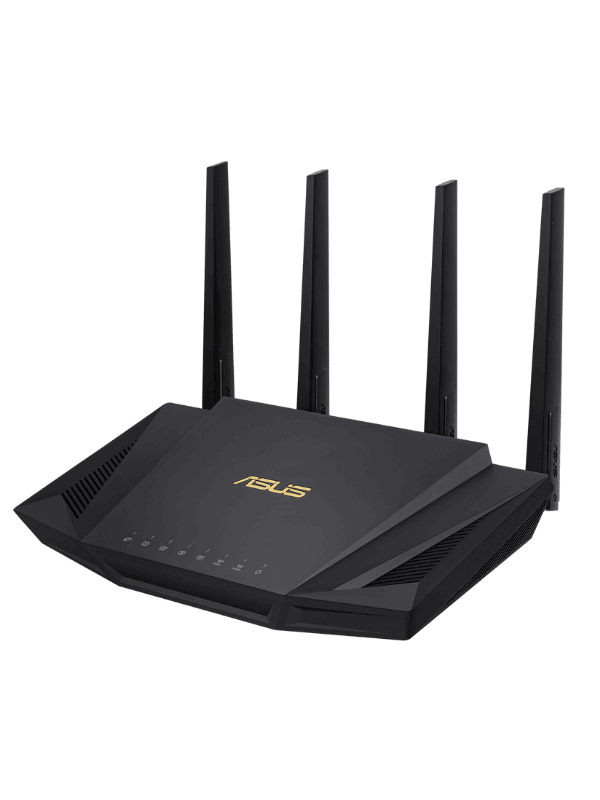
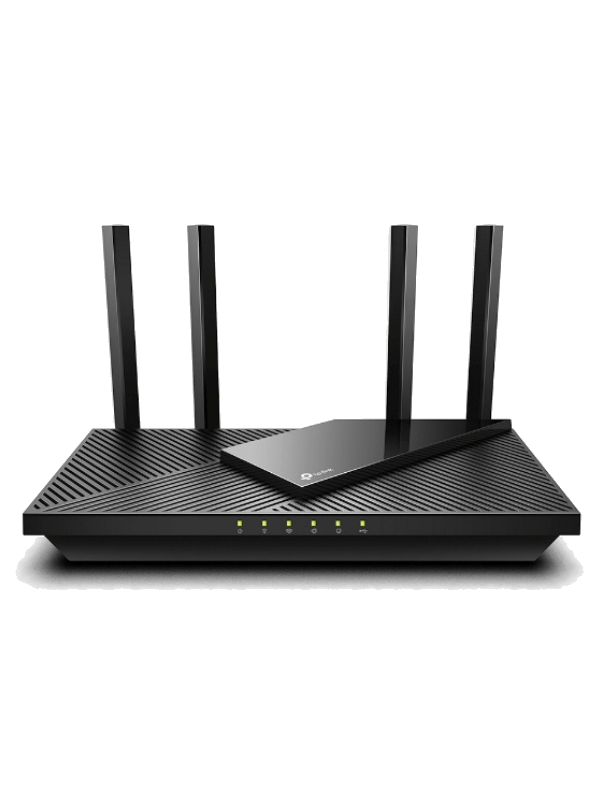
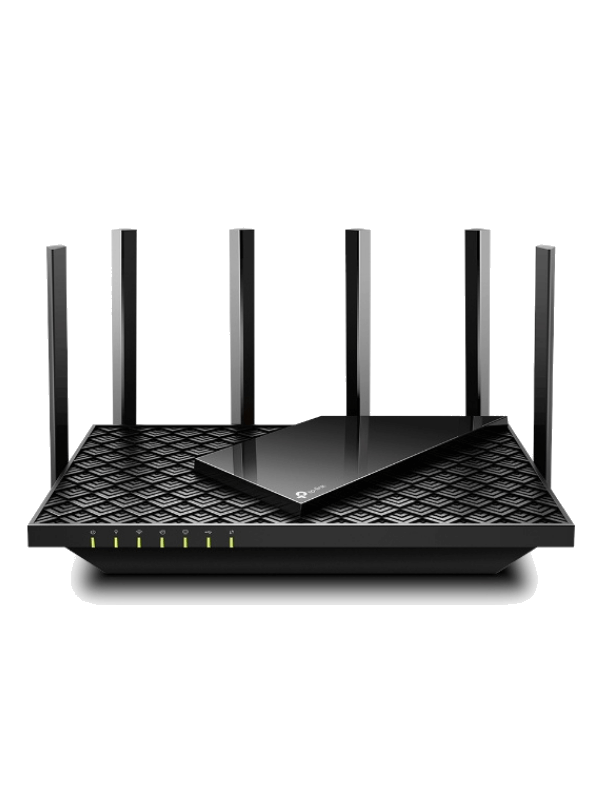
1 thought on “TP-Link Archer AX55 AX3000 Review”
Good article on the AX55. I’m just about to set it up. I’ve probably set up 20 routers in the past 20 years, all with servers behind the firewall serving web, mail, ssh, etc… From Linksys (the only game in town 20 years ago), to Tew, to D-Link, to Netgear to other TP-Link boxes, so I don’t expect any surprises. This AX55 will replace an aging Tew-633 that has performed well for (10-12? years). I’ll drop a link if I have any additional insight that differs from yours. This will be in a 3100 sqft 2-story — so I’m interested in how the wireless performs. (if there are any issues, I’ll just move the Tew-633 upstairs).
Thanks for the good review.